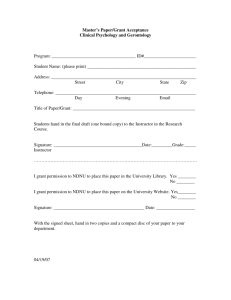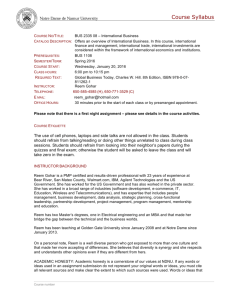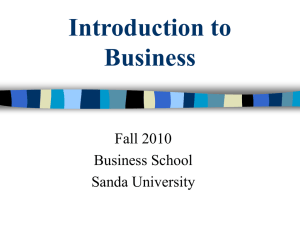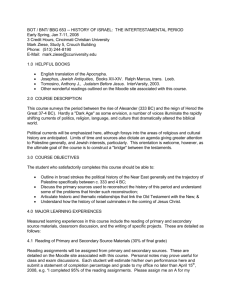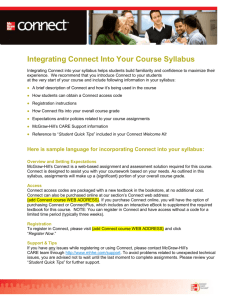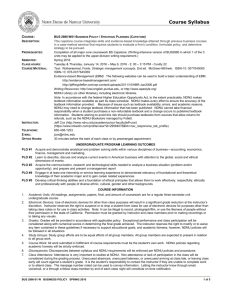Course Syllabus
advertisement
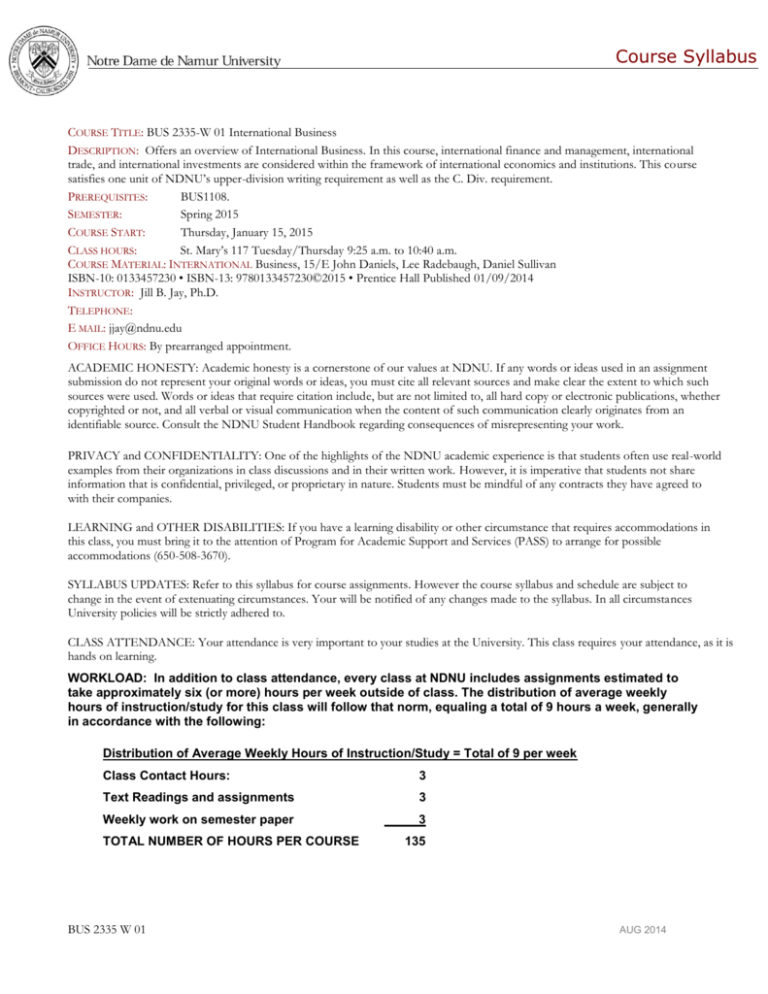
Course Syllabus COURSE TITLE: BUS 2335-W 01 International Business DESCRIPTION: Offers an overview of International Business. In this course, international finance and management, international trade, and international investments are considered within the framework of international economics and institutions. This course satisfies one unit of NDNU’s upper-division writing requirement as well as the C. Div. requirement. PREREQUISITES: BUS1108. SEMESTER: Spring 2015 COURSE START: Thursday, January 15, 2015 CLASS HOURS: St. Mary’s 117 Tuesday/Thursday 9:25 a.m. to 10:40 a.m. COURSE MATERIAL: INTERNATIONAL Business, 15/E John Daniels, Lee Radebaugh, Daniel Sullivan ISBN-10: 0133457230 • ISBN-13: 9780133457230©2015 • Prentice Hall Published 01/09/2014 INSTRUCTOR: Jill B. Jay, Ph.D. TELEPHONE: E MAIL: jjay@ndnu.edu OFFICE HOURS: By prearranged appointment. ACADEMIC HONESTY: Academic honesty is a cornerstone of our values at NDNU. If any words or ideas used in an assignment submission do not represent your original words or ideas, you must cite all relevant sources and make clear the extent to which such sources were used. Words or ideas that require citation include, but are not limited to, all hard copy or electronic publications, whether copyrighted or not, and all verbal or visual communication when the content of such communication clearly originates from an identifiable source. Consult the NDNU Student Handbook regarding consequences of misrepresenting your work. PRIVACY and CONFIDENTIALITY: One of the highlights of the NDNU academic experience is that students often use real-world examples from their organizations in class discussions and in their written work. However, it is imperative that students not share information that is confidential, privileged, or proprietary in nature. Students must be mindful of any contracts they have agreed to with their companies. LEARNING and OTHER DISABILITIES: If you have a learning disability or other circumstance that requires accommodations in this class, you must bring it to the attention of Program for Academic Support and Services (PASS) to arrange for possible accommodations (650-508-3670). SYLLABUS UPDATES: Refer to this syllabus for course assignments. However the course syllabus and schedule are subject to change in the event of extenuating circumstances. Your will be notified of any changes made to the syllabus. In all circumstances University policies will be strictly adhered to. CLASS ATTENDANCE: Your attendance is very important to your studies at the University. This class requires your attendance, as it is hands on learning. WORKLOAD: In addition to class attendance, every class at NDNU includes assignments estimated to take approximately six (or more) hours per week outside of class. The distribution of average weekly hours of instruction/study for this class will follow that norm, equaling a total of 9 hours a week, generally in accordance with the following: Distribution of Average Weekly Hours of Instruction/Study = Total of 9 per week Class Contact Hours: 3 Text Readings and assignments 3 Weekly work on semester paper 3 TOTAL NUMBER OF HOURS PER COURSE BUS 2335 W 01 135 AUG 2014 Course Syllabus WRITTEN ASSIGNMENTS: The School of Business and Management requires the use of the American Psychology Association (APA) publication guidelines as a standard for all papers. There are four written case assignments (500 words each with references cited) and one term paper. LATE HOMEWORK: Assignments are to be completed and submitted by the assigned times set in Moodle. Assignments not turned in on time are considered late. Late assignments will be accepted only for one week after the due date; after which time the assignment will not be accepted. Only up to one assignment may be turned in late during the duration of the class. Late assignments scores will incur an automatic reduction of 20% of point value. PARTICIPATION: As a diverse community of learners, students must strive to work together in a setting of civility, tolerance, and respect for each other and the instructor. Rules of classroom behavior include but are not limited to the following: Conflicting opinions among members of a class are to be respected and responded to in a professional manner. Side conversations or other distracting behaviors are not to be engaged in during lectures, class discussions or presentations There are to be no offensive comments, language or gestures Students are expected to exhibit an appreciation for multinational and gender diversity in the classroom and to develop management skills and judgment appropriate to such diversity in the workplace. Moodle: This is a paperless course; all written work will be completed in On-Line. No hard copies will be accepted. This will include the weekly extensive classwork required for this course. EXTRA CREDIT: None specified, though the opportunity to introduce it will be at the discretion of the instructor. COURSE MATERIAL - Published Textbook Information In accordance with the federal Higher Education Opportunity Act, to the extent practicable, NDNU makes textbook information available as part its class schedule. NDNU makes every effort to ensure the accuracy of the textbook information provided. Due to issues such as textbook availability, errors, and academic reasons, NDNU may need to change textbook information that has been published. NDNU cannot take financial responsibility when a student purchases a non-refundable textbook and a change occurs to published textbook information. Students wishing to avoid this risk should purchase textbooks from sources that allow returns for refunds, such as the NDNU Bookstore managed by Follett. LEARNING OBJECTIVES: 1. 2. 3. 4. 5. 6. 7. 8. 9. 10. 11. Identify the main drivers of globalization and international business. (PLO # 2) Recognize how the legal systems and economic systems of countries differ. (PLO#5) Define the nature of culture. Assess how managers can deal with ethical dilemmas in an international setting. (PLO#5) Recognize the importance of international trade. (PLO#1) Understand why governments are involved in international trade. Understand the implications of foreign currencies. (PLO#2) Define the fundamentals of international business strategy. (PLO#1) Recognize the risks associated with import & export. Identify possible challenges of international business. (PLO#1) Learning to write an APA-style paper, from topic development to organization of a review of the literature, including the specific protocols of APA-style, e.g. proper citation, references, etc. BUS 2335 W 01 AUG 2014 Course Syllabus ASSIGNMENTS VALUE & KEY DATES: Assignments Pt Value Due dates 200 Participation & Attendance 1000 Weekly assignments Midterm 100 Updated submissions of project 600 Final Presentation: Students present their term paper research 100 4/26 2200 POINT TOTALS GRADE/POINT CONVERSION A+ 100-97 B+ 89-87 C+ 79-77 D+ 69-67 3/3 A B C D 96-94 86-84 76-74 66-64 ABCD- 93-90 83-80 73-70 63-60 F 59 or < COURSE ACTIVITIES: Wk 1 2014 1/15 2 1/20 3 1/27 4 2/3 5 2/10 Chapter 7: Cross National Cooperation and Agreements Proper citation and APA review Post all work in Moodle; 2ndt draft of your project 6 2/17 Chapter 8: Global Foreign Exchange Markets Chapter 9: The Determination of Exchange Rates Students leading class discussion 7 2/24 Chapter 10: Global Capital Markets Chapter 11: Globalization and Society Students leading class discussion BUS 2335 W 01 Topics Course overview Introduction Assigned Readings/In class work Chapter 1: Globalization and International Business Chapter 2: The Cultural Environments Facing Business Critical thinking and research methods Assignments In Class Assignment Chapter 3: Political and Legal Environments Facing Business Chapter 4: The Economic Environments Facing Business Critical thinking and writing scholarly papers (in class discussion) 1. Submit project ideas – see notes below for the outline Chapter 5: International Trade and Factor Mobility Theory Making an outline; writing strategies APA – preparing your first draft Post all work in Moodle; 1st draft of your project Chapter 6: Government Influence on Trade Students leading class discussion AUG 2014 Course Syllabus 8 3/3 Midterm version of your paper due March 3rd (APA format) 9 3/17 10 3/24 11 3/31 12 4/7 13 4/14 14 4/21 Chapter 20: International Human Resource Management 15 4/28 On 4/28 and 4/30 16 4/26 Moodle posting of final project Chapter 12: The Strategy of International Business Chapter 13: Country Evaluation and Selection Chapter 14: Export and Import Chapter 15: Direct Investment and Collaborative Strategies Chapter 16: The Organization of International Business Chapter 17: Marketing Globally Chapter 18: Global Manufacturing and Supply Chain Management Chapter 19: International Accounting and Finance Issues In Class Presentations of individual projects Moodle: Rough draft of final paper/project Students leading class discussion Post all work in Moodle; 3rd draft of your project Students leading class discussion Post all work in Moodle; 4th draft of your project Students leading class discussion Nothing due – catch up Final Paper Due in Moodle 4/26 Final Project: The term paper represents the student’s ability to integrate and apply the ideas discussed in the class. The final term paper should be approximately 30 pages, Size 12 font, Times New Roman, 1-inch margins, with at least 15 references cited APA format in the bibliography. Your paper will be evaluated on the basis of substance (reflection, research, etc.), technical accuracy (spelling, grammar, etc.), and form (appearance, organization, etc.). Students will choose the topic and they will present the paper in the last week of the class. Directions for the term paper (further directions will be found in Moodle assignments): Part I: Begin to think about what you will work on for your semester paper. Each student will pick a different company with a different nationality. The student will identify 3 foreign markets where the company desires to do business. You will adopt a functional perspective (International marketing manager, HR manager, Finance manager, Accounting manager, Operations manager) for your role in writing the paper. Your report (Term Paper) will advise and guide senior management with regard to the best market to enter. Each topic will have a separate section, with subsections, if necessary. The graphs should be in the body of the paper with source listed under the graph. The paper must be in APA style with all references in the end. Students are expected access and reference company reports, government reports (Department of Commerce, for example), UNCTAD and WTO statistics, competitive reports, and business journals (The Economist, Business Week, Wall Street Journal). Things to consider and address in your paper: External environments that affect the ways in which firms operate internationally include physical, societal, and competitive factors. In fact, the amount of adjustment required in foreign operations is largely influenced by the extent to which the home and host country environments resemble one another. A. Physical and Social Factors BUS 2335 W 01 AUG 2014 Course Syllabus 1. Geographic Influences. The uneven distribution of resources results in different opportunities being located in different parts of the world. In addition, geographic barriers affect transportation, communications, and distribution channels within a country. Finally, the probability of natural disasters and adverse climatic conditions make it riskier to invest and operate in some countries than others. 2. Political Policies. Politics often determine where and how international business takes place because of the influence of government leaders over the process. 3. Legal Policies. While every nation has its own body of business law, agreements between/amongst nations determine international law. Domestic business law may include regulations on home-country firms in both home and host countries regarding such matters as taxation, employment, and foreign exchange transactions. International law may also determine how and whether firms can operate in certain locales. [Note: while most countries have laws that recognize and protect intellectual property rights, many do little to enforce them.] 4. Behavioral Factors. By studying the disciplines of anthropology, psychology, and sociology, managers can better understand the interpersonal norms of people in foreign countries and the reasons why operating procedures may need to be adjusted in foreign locales. 5. Economic Forces. Among other things, economics explains why countries exchange goods and services, why capital and people travel among countries in the course of business, and why one country’s currency has a certain value compared to another. It also provides the analytical tools to determine the impact of foreign operations on home and host countries, as well as the effect of a country’s economic policies and conditions upon domestic and foreign firms. B. The Competitive Environment The global competitive environment varies both by industry and by country. Likewise, a company’s competitive situation may differ in terms of its relative strength and in terms of which competitors it faces from one country to another. Thus, a firm’s competitive strategy directly influences how and where it can operate most effectively. A firm’s competitive strategy for products will usually involve competing on the basis of price or differentiation. Differentiation strategies can be based on a brand image or a unique characteristic. Company resources and experience influence choice of strategy, and competitors faced in each market may alter overall global strategy. Part II: Based on your analysis from Part I, you will identify five of the biggest issues facing the company with regards to its international strategy and your functional expertise (marketing, operations, finance, accounting, human resources). You will propose at least five strategies for addressing the issues and opportunities, given the company’s resources, capabilities, and purpose. Then you will propose a budget for fiscal year January 2015-December 2015to implement your strategies. BUS 2335 W 01 AUG 2014
